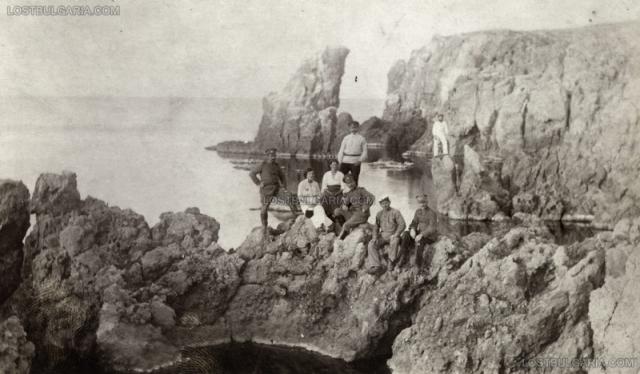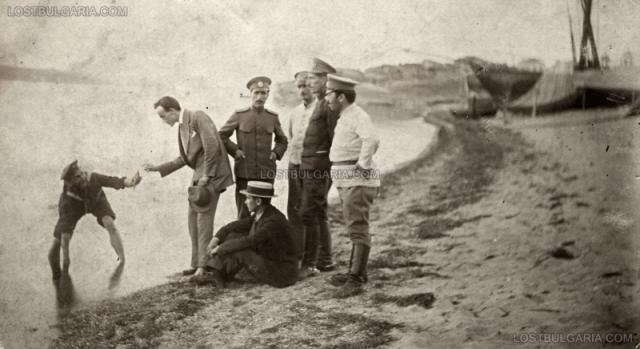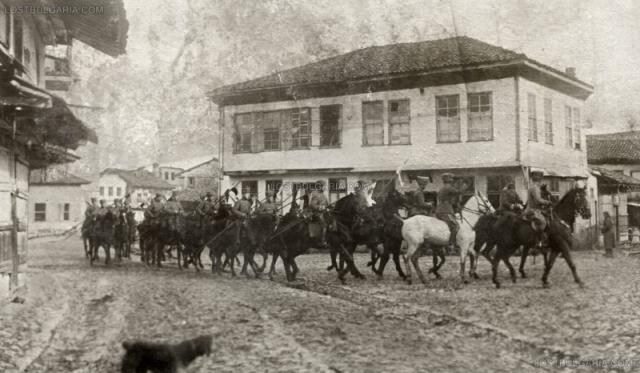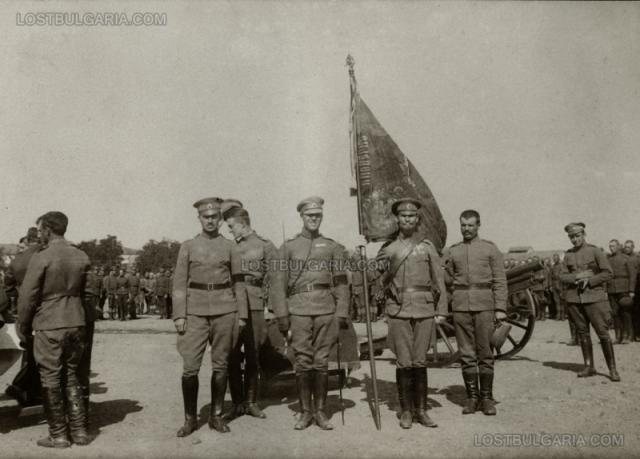The photos used are from the website of lostbulgaria.com
Polina Spartyanova
On this day 100 years ago, Austria-Hungary declared war on Serbia, and invaded its territory. Thus began the First World War, and gradually it included Germany, France and the UK.
The following year, Bulgaria joined the war on the side of the Triple Alliance (the Entente), and after that the other countries of the Balkan Peninsula were challenged to take part in military action. Today, 100 years after the First World War, we are meeting with Lilia Krivorova, a Chief Expert at the National Museum of Military History in Sofia to learn more about the consequences for Bulgaria and the region of this military conflict.
One hundred years after the beginning of World War I, what is its global significance from a modern perspective?
The First World War centenary is a good occasion to assess its significance related primarily to the effects of this greatest conflict in previous history. The war ended with important military, economic and political results affecting the coming decades. On the battlefields, 10 million people died, and another 20 million remained crippled.

The war reshaped Europe's borders to the detriment of the defeated countries. The Austrian-Hungarian Empire descended from the political scene together with the Second German Reich. Bulgaria was not spared either - it lost some territories.
A few of the colonies were redistributed too. Sanctions were imposed by the victors in order to establish lasting peace, which, however, was a prerequisite for future conflicts.
The search for new ways to solve the political crisis led to the emergence of Fascism in Germany and Bolshevism in Russia, and we are all very familiar with the tragic results.
Both winners and losers faced economic crisis, which lasted many years. The situation was extremely difficult for the states that lost the war as they had to pay huge reparations. Only the U.S. economy remained intact. The USA was the only creditor, and after the war the world gold reserves were flooding to them.
As a result of the war, in January 1919, an international organisation was founded - the League of Nations, which proclaimed the achievement of world peace, but actually wanted to preserve the Versailles system imposed by the victors.

How important for Bulgaria is this anniversary today?
The anniversary of the First World War was the occasion for reviewing and overhauling all the problems associated with the Bulgarian participation in it. This involved the reasons for joining the Central Powers, the participation of the Bulgarian army in the Coalition operations on the Balkan stage of war (quantity of troops, set goals and objectives, results achieved regarding the art of war), economic problems during and after the war and its impact on the development of public relations.
The right conclusions will not only illuminate the past, but they will be a prerequisite for not repeating mistakes made at the time.
What are the historical mistakes Bulgaria made 100 years ago?
The main mistake of the Bulgarian politicians was the decision that Bulgaria was to join the Central Powers. Bulgaria perceived involvement in the war as an opportunity for the national ideal of uniting all the lands inhabited by Bulgarians.
This objective had not been achieved in previous Balkan wars, so the government was willing to join the coalition guaranteeing more benefits for Bulgaria at the end of the war.
The Entente states could not formulate a unified policy for Sofia, and their proposals were too conditional. The Central Powers promised Bulgaria the whole Vardar Macedonia, and all the lands seized from Bulgaria due to the Bucharest Peace Treaty in 1913.
The possibility of compensation in the Moravian region was underlined, with the cities of Pirot, Niš and Vranje included. The promises sounded good, but certain conditions had to be met - the Central Powers had to win first. In the summer of 1915, the political and military leaders of the country were not able to assess the outcome of the war.
The Bulgarian statesmen ignored the most important factor tested and proven by practice and time. Unification of people, including the Bulgarians, is likely to be achieved only gradually, through a methodical and persistent approach, in different stages and with the efforts of several generations of Bulgarians.

Certain weaknesses were allowed in shaping the economic, military and technical terms in the documents for joining the coalition. The Military Convention governed only the relations during the war with Serbia, therefore the Bulgarian army was later left to fight alone on the Southern (Thessaloniki) front.
Moreover, Bulgaria continued to participate in the war even after achieving its political objectives. The Bulgarian army spent three years on the Southern Front, holding 35 covenant divisions, and practically defending foreign interests.
What was Bulgaria’s role in the war?
Bulgaria's participation in the First World War can be separated into two major periods: of manoeuvre – from Bulgaria’s involvement in the war starting on 14 October 1915 until the end of 1916; and of position - from the beginning of 1917 until the end of the war.
The war period of manoeuvre encompassed the military actions against Serbia and Romania. In 1915, the First and Second Army held the Moravian, Ovchepolska and Kosovo operations. In collaboration with the German and Austrian-Hungarian troops invading from the north, they defeated the Serbian army, seized Kosovo Pole and reached the Albanian border. At the same time, they staved off the attempts of the Allies to invade the valley of Vardar River and drove them to the border between Greece and Serbia. In August 1916, the First Army conducted Lerinska and the 2nd Army the Strouma operation, resulting in the final establishment of the Southern Front. Subsequently, the Third Army, together with its allies, fought against Romania and consequently completed the Tutrakan, Kubadin and Muntenska offensive operations by which Dobrudzha was liberated, and reached the river of Seret.
During the war period of position (1917-1918), the Bulgarian army took defensive action on the Southern Front and withstood several attempts of the Entente armies to break the front, which they finally achieved in September 1918. By creating great superiority against the poorly equipped and insufficiently armed Bulgarian Army, the opponent had a breakthrough at the front of Dobro Pole. On 29 September 1918, in Thessaloniki, Bulgaria signed an armistice with the Entente and left the war.

What was Bulgaria’s role in the international political strategy?
The German plan for taking fast military actions was caused to fail, and in 1915 the war became of positional character. Both coalitions had to seek ways to attract new countries. Located in the centre of the Balkans, Bulgaria suddenly became a country of significant importance. Bulgaria was the country on which the behaviour of Romania and Greece largely depended.
If Bulgaria had decided to join the Entente, this would have affected the Entente states’ position, which in its turn would have isolated Turkey from its allies and would have put an end to their plans for the Balkans.
Bulgaria was very important for the Central Powers and without it, Germany would have found it really hard to make its way to Constantinople, the Persian Gulf and the Suez Canal. Austria-Hungary experienced insurmountable difficulties in trying to seize Serbia and needed the help of the Bulgarian Army. Therefore, the Central Powers were more generous to Bulgaria in their promises for territorial acquisitions after the war.
What was the impact of the Bulgarian political loss in the period between the First and Second World Wars?
Between the two world wars, the Bulgarian politicians sought to find ways for Bulgaria to emerge from international isolation and become an equal partner of the other Balkan and European countries. However, they met fierce resistance on behalf of the winners trying to preserve the post-war status quo. Moreover, in Southeast Europe, unions directly targeted against Bulgaria were established.
In 1920, the newly created Kingdom of Serbs, Croats and Slovenes (called the Kingdom of Yugoslavia after 1929) and Czechoslovakia, along with Romania, signed an agreement to create the so called Little Entente. On 9 February 1934, in Athens, a Balkan agreement was signed between Greece, Turkey, Yugoslavia and Romania, which became popular as the Balkan Pact or Agreement , also known as the Balkan Entente.
They aimed at preserving the post-war system and counteracted the Bulgarian desire for a peaceful revision of the Neuilly dictate. The Bulgarian politicians were strongly supported by Germany, which also sought to reject the unjust post-war arrangements. This was a serious prerequisite for the two countries to be allies in WWII.

Did the Balkan countries manage to receive what they failed to gain back during the past two Balkan wars?
The results for the Balkan Peninsula countries depended on which coalition they were part of in the First World War. The most negative consequences were faced by Bulgaria, which was struck by a second national catastrophe. On the battlefields, 101,234 officers, non-commissioned officers and soldiers were killed, died of wounds and disease, or disappeared, and the wounded people were over 155,000.
According to the provisions of the Neuilly Treaty of 27 November 1919, Bulgaria was deprived of its land in South Dobrudzha, Western Thrace and the Western regional area. The imposed reparations amounted to 2.25 billion gold francs, and the armed forces were reduced to 30,000 people.
Neighbouring countries benefitted from the evicted Bulgarian areas. Romania again received Southern Dobrudzha, Greece took Western Thrace, which deprived Bulgaria of access to the Aegean Sea, and the Kingdom of Serbs, Croats and Slovenes received the region of Dimitrovgrad, Bosilegrad, Strumica and some villages in the area of Tran and Koula. Thus, the national question in the Balkans was further exacerbated, which was a prerequisite for new alliances and future military conflicts.

What would have Bulgarian history been like in the last 100 years if the state had been on the winning side in World War I?
In history, we do not generally reflect on the “if” possibilities, but Bulgaria could have received some benefits if it had participated on the side of the Entente. Significant territorial expansion is unlikely, given that we would have been in a coalition with Serbia, Greece and Romania. However, war could have been a successful step towards national unity. Moreover, Bulgaria would have secured favourable conditions for political and economic development in the decades after World War I without paying any reparations.
The centenary of the First World War is a good occasion to assess its significance related primarily to the effects of this greatest conflict in previous history. The war ended with important military, economic and political results affecting the coming decades. On the battlefields 10 million people died and another 20 million remain crippled.